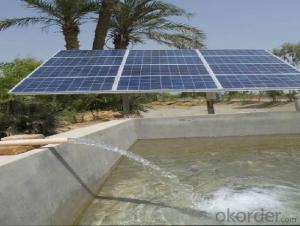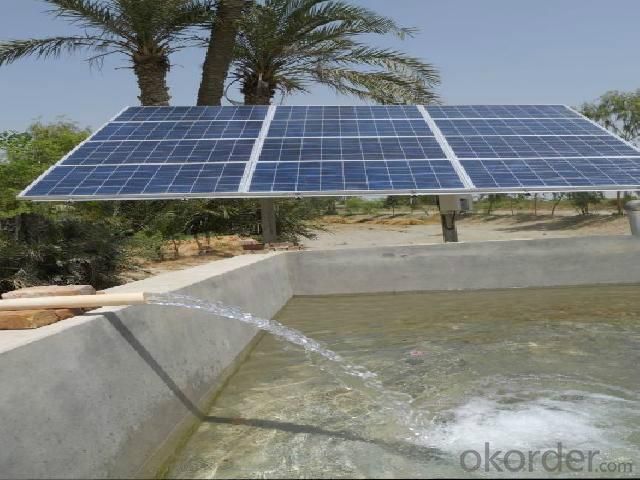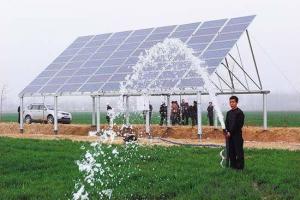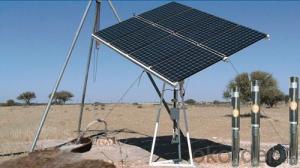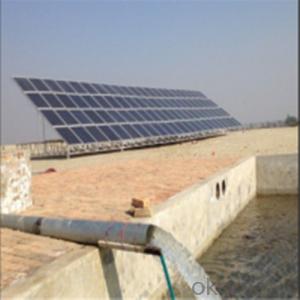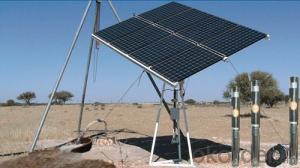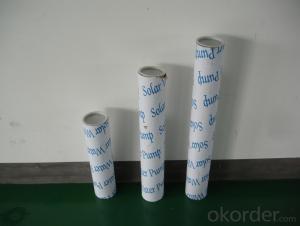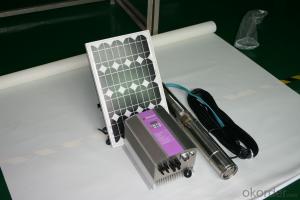Solar Pump Water Fountain - Cheap Solar Panels for Solar Pool Heating and Solar Water Pumping
- Loading Port:
- Shanghai
- Payment Terms:
- TT OR LC
- Min Order Qty:
- 1 set
- Supply Capability:
- 1000 set/month
OKorder Service Pledge
OKorder Financial Service
You Might Also Like
Cheap Solar Panels Solar Pool Heating Solar Water Pumping
DC solar water pumping system consists of the motor, pump, controller, solar array and some other accessories, such as water level sensor, float switch, etc. Considered that storing water is more efficient than storing electricity, the system is designed to directly drive the pump without battery which can reduce the construction and operating cost and routine maintenance effectively.The PV array consists of multiple solar panels connected in series/parallel, which can supply the whole system as power source by converting the absorbed solar radiation energy to the electrical energy. The pump driven by a brushless DC permanent magnet motor draws water from deep-well or river. The pumped water is then fed into reservoir or water tank, or connected to the irrigation system or fountain system directly.
Advanced Technology
Applications Innovation
The efficiency of DC brushless permanent magnet motor has been increased up to 25% in comparison with traditional asynchronous motor.
Technology Innovation
Stator and rotor are sealed by environment friendly casting resin.Motor insulation resistance can be hold higher than 300MΩfor more than 10 years, which consumedly increased the security and reliability of the submersible motor.
Structure Innovation
Casting resign technology processed stator and rotor as well as the water lubricated bearing make the submersible pump environment friendly.
Feature
High Efficiency & High Reliability
DC Brushless Permanent Magnet Motor
Minimum Maintenance, long Service Life
Environment Friendly Materials, Lubricated Without Oil
Application
Village or Family Water Supply
Animal Drinking Water & Livestock Watering
Garden/Courtyard Irrigation
Swimming Pool
Water Supply for Bivouac or Camping Car
Water Supply for Remote Area
Automatic Control
Operate Automatically, No Need Watching
Maximum Power Point Tracking (MPPT)
Dry-run Protection
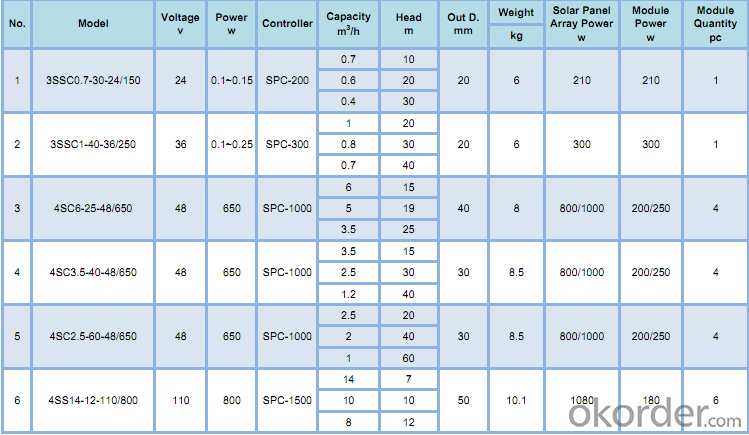
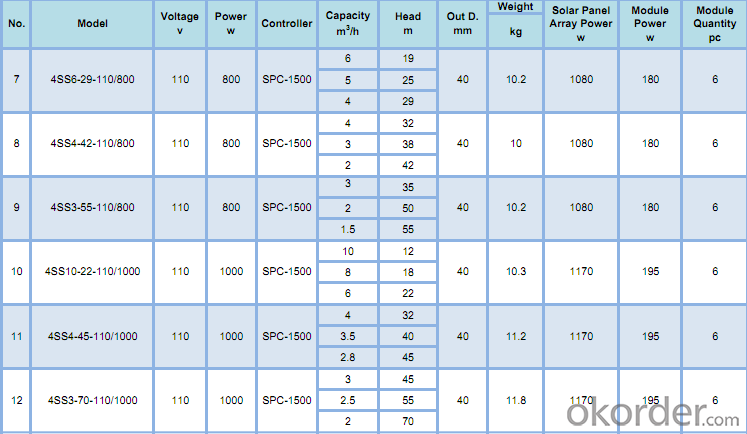
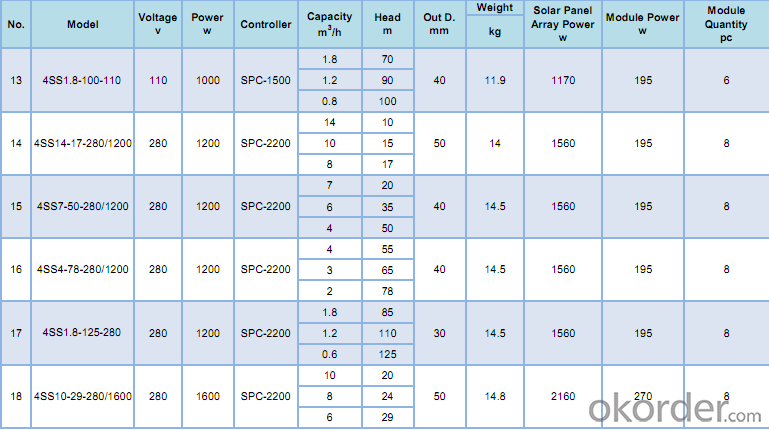
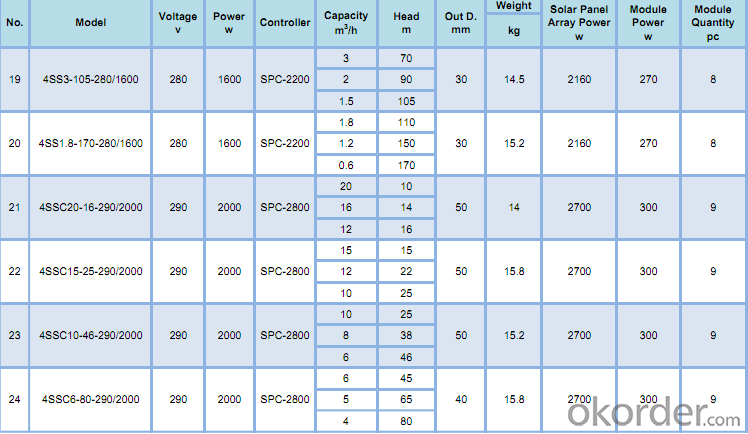
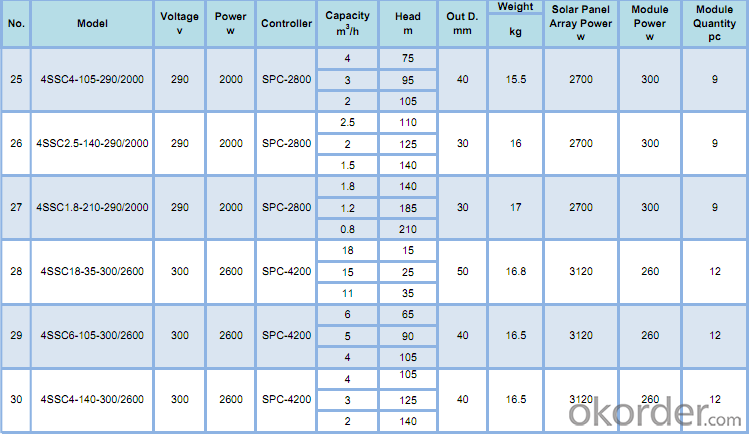
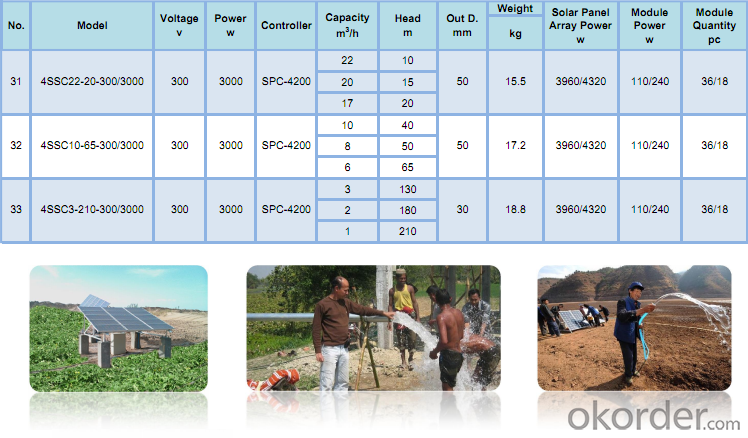
- Q: Can solar pumps be integrated with existing water filtration systems?
- Yes, solar pumps can be integrated with existing water filtration systems. Solar pumps can provide the necessary power to operate the filtration system, ensuring a sustainable and renewable source of energy. This integration allows for an efficient and environmentally friendly water filtration process.
- Q: Can solar pumps be used for water supply in schools or educational institutions?
- Yes, solar pumps can definitely be used for water supply in schools or educational institutions. Solar pumps are an eco-friendly and cost-effective solution, as they rely on solar energy to operate and do not require electricity from the grid. They can provide a reliable and continuous water supply, ensuring access to clean water for drinking, sanitation, and other educational needs. Additionally, the use of solar pumps promotes sustainability and serves as a valuable educational tool to teach students about renewable energy sources and their applications.
- Q: How does a solar pump handle power fluctuations in the electrical grid?
- A solar pump is typically designed to operate independently from the electrical grid, so it is not directly affected by power fluctuations in the grid. The pump relies on solar energy to power its operations, utilizing solar panels to convert sunlight into electricity and store it in batteries for continuous operation, even during cloudy periods or at night. This self-sustained system ensures that the pump can continue functioning reliably without relying on the grid's power supply or being impacted by its fluctuations.
- Q: How does a solar pump handle water with high levels of heavy metals or radioactive materials?
- A solar pump itself does not have the capability to handle water with high levels of heavy metals or radioactive materials. The primary function of a solar pump is to draw and pump water using solar energy. To handle water contaminated with high levels of heavy metals or radioactive materials, additional steps and technologies such as filtration, sedimentation, or reverse osmosis systems would need to be incorporated into the water treatment process. These additional measures are necessary to remove or reduce the concentration of such contaminants, ensuring safe and clean water for various purposes.
- Q: Can a solar pump be used for water supply in off-grid botanical parks?
- Indeed, water supply in off-grid botanical parks can be facilitated by the use of solar pumps. These pumps are specifically designed to operate by harnessing energy from the sun, making them an environmentally friendly choice for water supply. They have the ability to extract water from various sources such as wells or boreholes and transport it to the desired locations within the park, such as irrigation systems, ponds, or water features. The suitability of solar pumps for off-grid locations is particularly notable due to their independence from electricity grids and fossil fuels. Instead, they utilize photovoltaic panels to convert sunlight into electricity, which powers the pump. This inherent reliance on solar energy contributes to their reliability and cost-effectiveness, as they do not rely on external energy sources and require minimal maintenance. Moreover, solar pumps can be easily customized to meet the specific water demands of botanical parks. They are available in different sizes and capacities, allowing park managers to select the most appropriate pump for their needs. Additionally, solar pumps often come equipped with advanced features, such as automatic on/off switches, water level sensors, and variable speed drives, which ensure efficient and precise water distribution throughout the park. To summarize, solar pumps provide a viable and sustainable solution for water supply in off-grid botanical parks. They offer a multitude of advantages, including reduced energy costs, minimal environmental impact, and reliable operation, making them an excellent choice for fulfilling the water requirements of the park while reducing reliance on traditional energy sources.
- Q: Can a solar pump be used for water supply in a farm?
- Yes, a solar pump can be used for water supply in a farm. Solar pumps are designed to harness energy from the sun and convert it into mechanical power to pump water. They are an environmentally friendly and cost-effective solution for farms, as they can provide a continuous and reliable water supply without relying on grid electricity or fuel. The use of solar pumps for water supply in farms can help reduce operational costs and promote sustainable agriculture practices.
- Q: Can a solar pump be used for water supply in a recreational park or campground?
- Yes, a solar pump can certainly be used for water supply in a recreational park or campground. Solar pumps are a great alternative to traditional electric or diesel pumps in areas where there is ample sunlight available. They operate using solar panels to generate electricity, which is then used to power the pump and draw water from a source such as a well or a reservoir. Using a solar pump for water supply in a recreational park or campground has several advantages. First and foremost, it is an environmentally friendly option as it relies on renewable energy from the sun. This reduces carbon emissions and helps to mitigate climate change. Additionally, solar pumps are typically low maintenance and have a long lifespan, making them cost-effective in the long run. In terms of practicality, solar pumps can be easily installed in remote areas without access to grid electricity. They are also capable of producing a consistent and reliable water supply, as long as there is sufficient sunlight available. This makes them ideal for supplying water to recreational parks or campgrounds, where a steady water source is essential for various activities such as showering, handwashing, and irrigation. However, it is important to consider a few factors before implementing a solar pump for water supply in a recreational park or campground. The availability of sunlight throughout the year, the water demand, and the size of the pump system should all be taken into account. Additionally, proper maintenance and monitoring are necessary to ensure the optimal performance of the solar pump. Overall, a solar pump can definitely be used for water supply in a recreational park or campground. It offers an eco-friendly and cost-effective solution that can provide a reliable and sustainable water source for various purposes.
- Q: Are solar pumps suitable for residential use?
- Yes, solar pumps are suitable for residential use. They are energy-efficient, eco-friendly, and can provide a reliable water supply for various household needs such as irrigation, gardening, and water circulation. Moreover, solar pumps eliminate the need for grid electricity, reducing electricity bills and providing a sustainable solution for residential water pumping.
- Q: Are there any government incentives for installing a solar pump?
- Yes, there are government incentives available for installing a solar pump. These incentives can vary depending on the country and region, but they often include tax credits, grants, and subsidies to encourage the adoption of renewable energy technologies like solar pumps. These incentives aim to promote sustainable practices, reduce reliance on fossil fuels, and mitigate climate change impacts. It is advisable to research and consult local government agencies or renewable energy organizations for specific incentives in your area.
- Q: Does the size of the solar panel affect the performance of the pump?
- The performance of the pump is indeed affected by the size of the solar panel. The solar panel is in charge of converting sunlight into electrical energy, which is what powers the pump. A bigger solar panel has the ability to produce more electricity, giving the pump a higher power output. This increased power output allows the pump to operate more efficiently and effectively, resulting in a higher flow rate or achieving a greater lift height. Conversely, if the solar panel is smaller, it may not generate enough electricity to meet the power requirements of the pump. This could lead to reduced performance and potentially lower flow rates or lift heights. Therefore, it is crucial to select the appropriate size of the solar panel to ensure optimal performance of the pump.
Send your message to us
Solar Pump Water Fountain - Cheap Solar Panels for Solar Pool Heating and Solar Water Pumping
- Loading Port:
- Shanghai
- Payment Terms:
- TT OR LC
- Min Order Qty:
- 1 set
- Supply Capability:
- 1000 set/month
OKorder Service Pledge
OKorder Financial Service
Similar products
Hot products
Hot Searches
Related keywords
